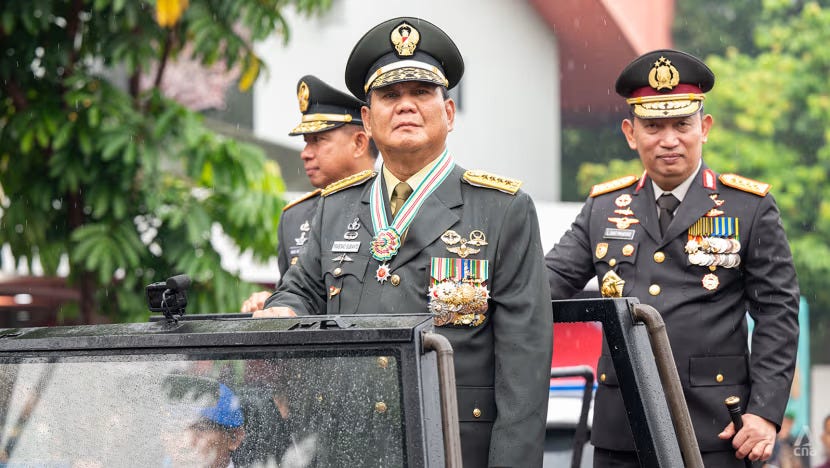Dwifungsi Returns to Indonesia
Prabowo unsettles critics by returning the military to prominence
“Dwifungsi is in the heart,” to adapt a phrase from the late Filipino writer Carlos Bulosan. At least it appears to be in the heart of Indonesian President Prabowo Subianto, who is slowly but steadily blurring the lines between an elected civilian government and the military, the TNI (Tentera Nasional Indonesia) and known in the Suharto era as ABRI, or Angkatan Bersenjata Republik Indonesia.
He has expanded the armed forces' role in civil government to the alarm of critics, including having them play a major role in his flagship Free Nutritional Meal Program (MBG) for school children, pregnant women, and breastfeeding mothers. His allies in parliament are also preparing legislation that would allow for the appointment of active military officers into senior government positions.
But Dwifungsi, or dual function for the military, really seems to be coming to the fore in a plan by Prabowo to augment regional military commands, which function as territorial units at the district level, bringing the total from the current 15 to individual commands in almost every one of Indonesia’s 38 provinces, along with a plan to create 100 territorial development battalions, deploying them in every district across the country within five years, significantly increasing the military presence in a region, multiple infantry battalions and specialized units like engineers, cavalry and field artillery.
For many years, dwifungsi was the basis of the New Order government of General Suharto when he seized power in 1967. The military was assigned the role of protector against disorder at home as well as a defense against foreign enemies. Power was centralized in the president and control of the regions was administered by officers with the civilian bureaucracy at their command, which may sound familiar in Prabowo’s current plans. That has raised deep concern among liberal circles in Jakarta, where those with long memories remember without any particular affection the 31 years of military rule from 1967 until Suharto’s resignation in 1998 following nationwide unrest over unrivaled corruption.
Nonetheless, belief in Dwifungsi is thus natural for Prabowo as a general himself, albeit a controversial one, not necessarily well regarded by fellow senior officers during the latter part of Suharto’s rule. He was accused of grave human rights violations and booted from the military following Suharto’s fall and was refused entry into the United States for many years. He was seen as more prone to arbitrary actions than contemporaries such as generals Benny Murdani and Wiranto but had the advantage of being married to one of Suharto’s daughters, Siti Hediati Hariyadi, known as Titiek.
Prabowo and his family were the very essence of dwifungsi. His father Sumitro Djojohadikusumu, a Dutch-trained economist, became a minister in the US-backed but short-lived rebel government established in Sumatra in opposition to President Sukarno. Sumitro himself was from minor Javanese nobility, his father had been an administrator under the Dutch and was the first director of Bank Negara Indonesia, the country’s central bank, on its establishment in 1946. He married a Christian from Manado in Sulawesi, a Dutch-trained nurse, Dora Sigar, of Minahasan and German descent.
Exiled to Europe, Sumitro only returned to Indonesia following the overthrow of Sukarno and the establishment of the New Order. As a minister, Sumitro had a huge influence on Suharto’s early economic policy and then through links to western-educated economists such as Ali Wardhaha and Wijoyo Nitisastro, dubbed the Berkely Mafia, in Suharto’s government. His own family came to symbolize dwifungsi, with one son, Prabowo Subianto, joining the military and another, Hashim Djojohadikusumo, becoming a leading businessman who was later to help his elder brother Prabowo recover in 1998 from his Asian Financial Crisis losses from a paper company investment. Prabowo is divorced from Titiek, but family connections via Hashim’s children and marriages across religious boundaries give the family a huge influence now and for the future.
Prabowo’s elite and de facto secular background, as well as his military status, explain his survival from the wreckage of the Suharto regime and the Asian Financial crisis. They also explain why and how his move into democracy-era politics has been characterized by opportunistic alliances to widely different groups, including as Megawati Sukarnoputri’s running mate in the 2009 election and as an Islamist in 2014 and 2019, organizing mass demonstrations by Islamists after he lost to Joko Widodo in 2019 before joining Jokowi’s government as defense minister.
Given this background, it is natural that he regards military men, accustomed to obeying and being obeyed, as vehicles to achieve objectives that might be frustrated by civilian bureaucracies or democratic elections. Thus, three-star general Novi Helmy has recently been appointed to run BULOG, the state logistics agency supposedly to ensure “partnership in food security between the agency and the military.” Helmy is still on active service so the appointment is arguably illegal. Retired military have been appointed to many positions including deputy ministers, and to run state agencies.
None of this is necessarily unpopular. The TNI has long been seen as the most trusted state institution and more efficient and less corrupt than the bureaucracy of the national police. But these moves come on the heels of Prabowo’s plan to replace elections for local and regional leaders with appointments and a massive expansion in ministerial posts to lure almost every party in the legislature into the coalition led by his Gerindra party. Dwifungsi, it seems, can be bought as well as imposed with a tame legislature likely to go along with his plans to limit democracy and enable more roles for active military officers.


Didit Hediprasetyo was born 22 March 1984, son of Prabowo and Titiek Suharto. He is a designer and (similar to Guruh, son of Sukarno) is said to be gay. He accompanied Prabowo when as new president he visited Beijing. Didit once had a girlfiend, the daughter of O.C. Kaligis (Suharto's lawyer at that time.)
Greg Poulgrain
ypoulgrain@gmail.com